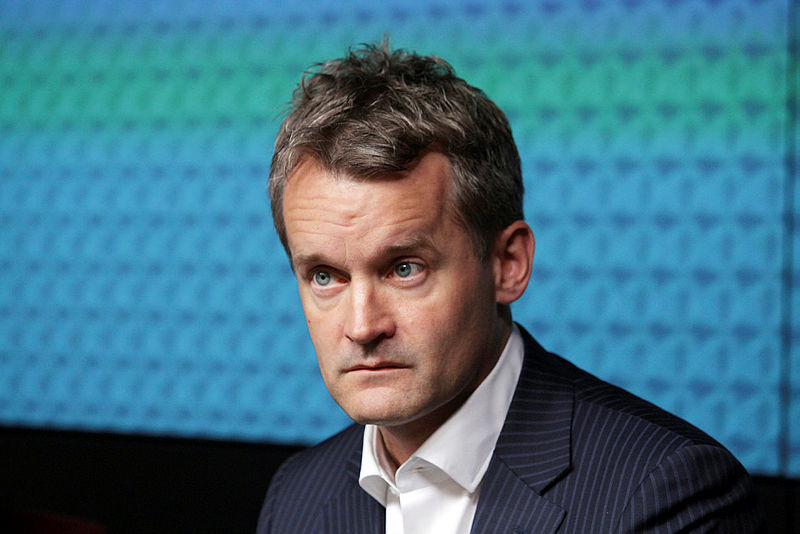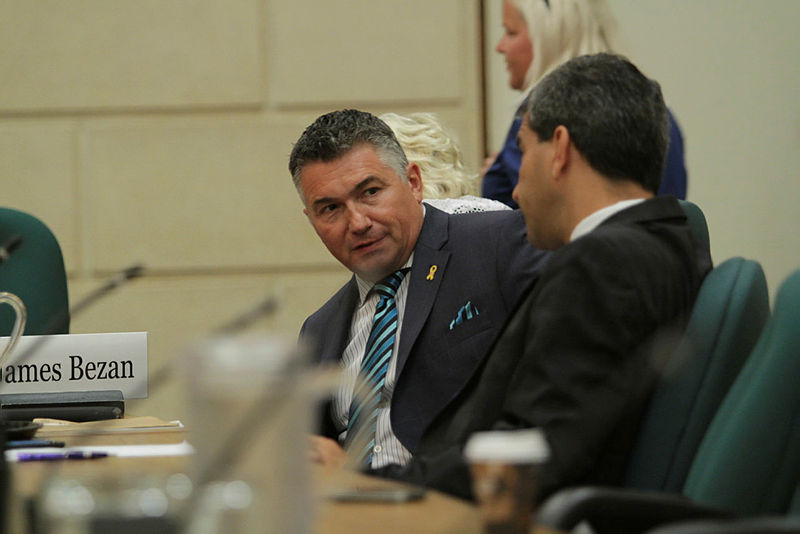Opposition parties call for improved support for transitioning military members in government’s new suicide prevention strategy
Page 1 of 1
 Opposition parties call for improved support for transitioning military members in government’s new suicide prevention strategy
Opposition parties call for improved support for transitioning military members in government’s new suicide prevention strategy
Opposition parties call for improved support for transitioning military members in government’s new suicide prevention strategy
As part of the strategy, the Liberal government is committing $4-million over four years for a veteran emergency fund to assist veterans in 'urgent and unique situations,' and another $13.9-million, also over four years, for a new veteran and family well-being fund, which aims to promote 'innovative research and services.'

Veterans Affairs Minister Seamus O’Regan called the government's new suicide prevention strategy is a 'cornerstone of our commitment to the well-being of military members, veterans and their families,' but the opposition Conservatives and NDP say it fails to ensure necessary supports are provided to members from their time in active service till they fall under the purview of Veterans Affairs.
By MARCO VIGLIOTTI
PUBLISHED :Friday, Oct. 20, 2017 12:00 AM
The Trudeau government’s recently unveiled mental health and suicide prevention strategy represents a move in the right direction by pledging resources to address what has become a serious issue for the Canadian Armed Forces (CAF), but more must be done to address gaps in care for service members transitioning out of active duty, says Conservative defence critic James Bezan.
Mr. Bezan (Selkirk-Interlake-Eastman, Man.) is calling on Ottawa to ensure members leaving active service continue to receive necessary financial and health supports as they are transitioning, and for the CAF’s surgeon general to be responsible for assessing wellness, not external health professionals unfamiliar with the military, as recommended by National Defence Ombdusman Gary Walbourne, an impartial and independent government officer who helps support members of the defence community.
“We welcome what they’re proposing [but] I think there are still some areas that need to be improved upon to help with transition,” he told The Hill Times. “The ombudsman’s … recommendations that he has brought forward over the past year-and-a-half need to be implemented as quickly as possible.”
Mr. Bezan said transitioning service members need to remain under the umbrella of the CAF in terms of salaries, benefits, and other supports until they completely transition over to the purview of Veterans Affairs, saying they deserve to “seamlessly” go from their National Defence salary to their veterans’ pension.
He also pushed for Ottawa to accept Mr. Walbourne’s recommendation for the medical determination of the military surgeon general of the health and wellness of a service member to be accepted by Veterans Affairs Canada, arguing that former CAF personnel shouldn’t have to be “retraumatized” by being assessed by external medical professionals lacking intricate knowledge of operational stress injuries, such as post-traumatic stress disorder.

Conservative MP James Bezan, pictured in this file photo.
Earlier this month, the Liberal government laid out a new suicide prevention strategy for active and former service members. The strategy, crafted in partnership with mental health experts, was promoted as a holistic endeavour from the Canadian Armed Forces and Veterans Affairs Canada.
Most notably, Ottawa is committing $4-million over four years for a Veteran Emergency Fund to assist veterans in “urgent and unique situations,” and another $13.9-million, also over four years, for a new Veteran and Family Well-Being Fund, which aims to promote “innovative research and services.”
Other major initiatives highlighted in the strategy include the Operational Stress Injury Social Support program, which offers confidential peer support to members, veterans, and families impacted by these sorts of injuries, and Road to Mental Readiness, a mental health awareness and resilience training program aimed at increasing “early awareness of distress, encourage care-seeking, normalize mental health challenges, and provide evidence-based skills to manage the demands of service and daily life.”
There’s also the Seamless Transition Task Force, made up of four dedicated implementation teams, that works to ensure a coordinated approach to the transition from active service to veterans, amongst other initiatives.
The strategy also highlighted the recent reopening of nine Veterans Affairs Canada offices that were previously closed by the former Conservative government, the addition of 400 new full-time staff to the department, and investments in improving brain-imaging capabilities to help better understand the biological underpinnings of mental illnesses.
“There is no simple solution or easy answer, but through this joint strategy, we will help our military members, veterans and their families reduce the risk of suicide and enhance ways of providing support where and when it is needed,” Veterans Affairs Minister Seamus O’Regan (St. John’s South-Mount Pearl, N.L.) said in a statement after the release of the new strategy.
“Doing everything we can to prevent suicide is a cornerstone of our commitment to the well-being of military members, veterans and their families.”
However, Mr. Bezan argued that the Liberals were merely following through on concepts and projects originally conceived by the former Conservative government, citing, in particular, the $100-million increase in funding for operational stress injuries and the doubling of the number of mental health professionals employed by the CAF ordered by the Tories.
Mary Bartram, a PhD candidate in public policy at Carleton University with a focus on access to mental health services, called the strategy “very comprehensive,” praising its expansive focus on promotion, prevention, and follow-up care for CAF members, veterans, and their families.
“I hope that this strategy also paves the way for more comprehensive mental health and suicide prevention strategies for the Canadian population,” she told The Hill Times.
In a statement, the NDP credited the report for outlining some important first steps, but said there remains critical shortcomings, arguing the new strategy “fails to call for any concrete action.”
NDP MP and party veterans affairs critic Irene Mathyssen (London-Fanshawe, Ont.) also criticized the Liberals for failing to include recommendations from Mr. Walbourne on assisting members as they transition out of the military, and singled out the lack of “additional supports” for families.
She slammed the strategy as a “piecemeal approach” that only offers employment, health care, and education services “after veterans have been released from the military,” arguing these “crucial” services must be put in place before members are released to ensure they make a seamless transition.
“Employment and financial security are key to a successful transition. Veterans must feel valued and that they have a purpose when they enter their new civilian life,” she said in a statement.
“This is what needs to be fixed and it can be fixed now. The men and women who have served this country deserve at least that from this government.”
However, Ms. Batram pointed to the joint nature of the strategy as a “good sign” that the National Defence and Veterans Affairs departments are working together to “improve coordination” when it comes to transitioning service members.
Derek Abma, communications strategist with the Department of National Defence, hailed the “collaboration and coordination” between the two departments, especially in supporting transitioning members, as a cornerstone of the new strategy.
“With more than 160 initiatives, this is the first time a coordinated and collaborative approach to suicide prevention has been created; dedicated to helping save the lives of veterans and CAF members,” he said, citing, in particular, plans to produce a clinician’s handbook on suicide prevention for the military before the end of this year, and a CAF and DND mental health in the workplace strategy, set to be implemented next spring.
“Because suicide is a complex, multi-dimensional issue, we will continue to evolve and improve the strategy as we expand our understanding of suicide and suicide prevention while aggressively moving forward to identify and implement comprehensive and multi-disciplinary solutions.”
Asked about criticism from the opposition, Mr. Abma pointed to how the CAF was reinventing its approaching to transitioning members to “ensure that members receive the professional, customized, and personalized support they need as they transition to post-military life.”
mvigliotti@hilltimes.com
The Hill Times
The Hill Times
https://www.hilltimes.com/2017/10/20/opposition-parties-call-for-improved-support-for-transitioning-military-members-in-governments-new-suicide-prevention-strategy/122365
 Similar topics
Similar topics» Retired Canadian peacekeeper calls feds suicide prevention strategy 'smoke and mirrors'
» Suicides
» Desmond family brings call for inquiry into military murder-suicide to Ottawa
» 'Hopefully we can make a difference': Edmonton veterans march for suicide prevention
» Carol Hughes - Government Needs to Better Support Canadian Veterans
» Suicides
» Desmond family brings call for inquiry into military murder-suicide to Ottawa
» 'Hopefully we can make a difference': Edmonton veterans march for suicide prevention
» Carol Hughes - Government Needs to Better Support Canadian Veterans
Page 1 of 1
Permissions in this forum:
You cannot reply to topics in this forum
 Home
Home

